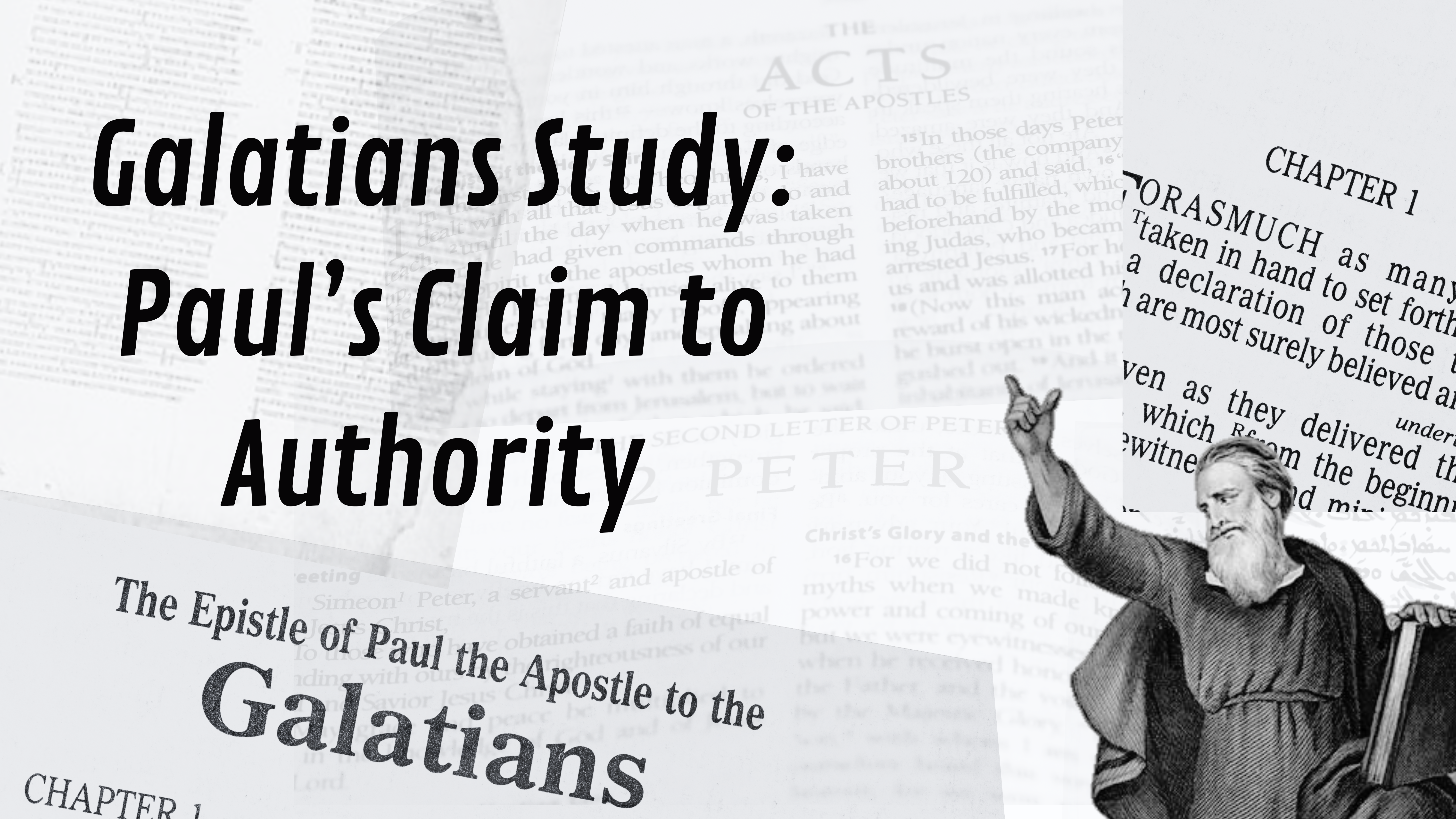Summary
- If you just read, “Is Paul Really an Apostle,” and you want to examine more about the authenticity of Paul’s apostleship then you’ll find this article to be interesting. If you haven’t read that yet I would suggest clicking the link as it provides a great foundation for this one. However, if you want the summary of that article and where we are going in this one I’ll bring you up to speed.
- In our examination of Gal 1:1-12, we saw that Paul claimed to be an apostle of Jesus Christ. He made it known that he had the authority and the ability to teach the church. He starts this letter with that claim to separate what he says from that of the false teachers in Galatia. These false believers want the Galatian church to go back under the slavery of the Law, but Paul wants freedom in the Spirit.
- In that last article, we saw that Paul’s apostleship was supported by Luke the Evangelist. Luke wrote 28% of the NT and gathered quotes from Ananias the Disciple, Barnabas the Apostle, and others. We saw in the article the Apostle Peter said that Paul’s words had equality with all scripture. Lastly, we examined the church fathers who helped keep the faith going after the apostles died. It would appear that unanimously Paul was supported as an apostle.
- In this article, we will take a look at Paul’s testimony in the Letter to the Galatian Church. We are going to examine why Paul would become a Christian. What value did he get out of it? What would separate him from other false prophets who were secretly after money and power?
Paul’s Testimony
“You know what I was like when I followed the Jewish religion—how I violently persecuted God’s church. I did my best to destroy it. I was far ahead of my fellow Jews in my zeal for the traditions of my ancestors. But when he who had set me apart before I was born, and who called me by his grace, was pleased to reveal his Son to me, in order that I might preach him among the Gentiles.” Gal 1:13-16
What is a testimony? According to Easton’s Bible Dictionary, it is a witness or evidence to something. In this case, the something is how Jesus Christ changed his life, with evidence from how he used to live his life. From what we can see Paul used to hate the Christian church. He was willing to persecute and destroy it. He burned in his passion for his Jewish roots and came from a strict sect of Judaism. This sect of Jewish believers were called Pharisees. The mentality of this group was that Jesus was a blasphemer worthy of being killed along with anyone who followed him.
What we don’t see in this testimony is how he encountered Jesus. To do so, you can read Acts Chapter 9. To summarize that passage, Paul encountered the risen Christ on the road to Damascus. Paul was blinded by the light of the Lord in his encounter with Jesus. He was then led to meet a disciple of Christ, named Ananias who lifted the blindness from Paul’s eyes. It was then that Paul started his conversation to follow the messiah. Paul abandoned everything in his old life to follow Christ.
From what I can tell this testimony doesn’t exactly paint Paul in the best light. He abandoned his religion which was shameful at that time. He also left the strictest sect of Judaism to follow Christ. He most likely walked away from his entire family and would have been a social outcast for this decision. Worst of all he started to follow Jesus after persecuting his followers.
When we look at his testimony we have to ask, “Why would he do this?” Someone would not normally say or admit these things. Why would someone admit that they were zealous for their traditions to the point that they even murdered the people they now serve? That would be odd as his letters were to Christians. These people could try him for his confession. His crimes are even corroborated by the Book of Acts (Acts 22:4).
Well, maybe Paul is getting out of being tried by Christians by saying their own Lord appointed him. Maybe he’s trying to get some wealth, status, or gain. Although, looking at Paul’s life it doesn’t seem like being an apostle benefited him much. He spent many days in prison for preaching the Gospel, so he definitely didn’t escape prison. We will later examine how he didn’t gain anything monetary or physical either. But to top it off he would take his faith to the extreme, eventually being beheaded by Roman officials. It looks like he didn’t escape death, but instead faced it in the worst way.
Did Paul benefit from becoming a Christian?
Paul switching from being a Jewish Pharisee to a Christian was not socially, financially, or physically beneficial. Socially we can look at what he gave up. In Judaism, he was being trained by an important rabbi and advancing in his faith beyond people his age. Someone that gifted was destined for greater office in Israel than just being a rabbi. That office would probably have been the Sanhedrin. Those of the Sanhedrin had honor, power, and respect. They set laws and judged Israel. He may have very well been on his way to joining their ranks.
Looking away from what Paul might have gave up, he definitely would’t have been accepted by his Jewish friends and family. Jesus was a blasphemer and a criminal in the minds of the Pharasees. I don’t think any of his friends or family would have accepted his choice. Leaving your religion was shameful in that time for any culture. However, I want to make it clear Paul did not leave Judaism nor did he seperate Christ from Judaism. I just mean that in the eyes of others they would have thought he did.
Financially, I know Paul has explained in other letters that he doesn’t willfully take an offering from other followers. We do know that while in prison he let believers send him things on their own volition (Phil 4:15). He instead worked amongst them in his trade of tent-making (1 Cor 4:12; 1 Thess 2:9; 1 Cor 9:6). He experienced being poor to the point of having to go without food (Phil 4:11-13). He seemed to live wherever the Gospel took him. This led to him living in prison at the end of his life. So, if Paul were looking to gain monetary wealth it doesn’t appear that he got any.
Physically Paul suffered much for the Gospel. I would put it all in a paragraph, but I don’t have to. I believe if you want to examine how much he suffered for his faith we can examine 2 Corinthians 11:23-33.
“Are they servants of Christ? I know I sound like a madman, but I have served him far more! I have worked harder, been put in prison more often, been whipped times without number, and faced death again and again. Five different times the Jewish leaders gave me thirty-nine lashes. Three times I was beaten with rods. Once I was stoned. Three times I was shipwrecked. Once I spent a whole night and a day adrift at sea. I have traveled on many long journeys. I have faced danger from rivers and from robbers. I have faced danger from my own people, the Jews, as well as from the Gentiles. I have faced danger in the cities, in the deserts, and on the seas. And I have faced danger from men who claim to be believers but are not. I have worked hard and long, enduring many sleepless nights. I have been hungry and thirsty and have often gone without food. I have shivered in the cold, without enough clothing to keep me warm. Then, besides all this, I have the daily burden of my concern for all the churches. Who is weak without my feeling that weakness? Who is led astray, and I do not burn with anger?” 2 Cor 11:23-33
When we look at this its hard to imagine that Paul’s physical well being was strengthened by being a Christian. Being whipped, put in prison, being stoned, lost at sea, beaten with rods, and getting robbed sounds like it sucks. So, if you still think at this point Paul was trying to be an apostle because it was beneficial for him then I don’t know how. Unless, when Jesus said Paul would suffer for his name, it was true (Acts 9:16)! Even still if we just aren’t sure or maybe we feel that Paul could be lying about his suffering we can look toward the stories written about him.
External Evidence Points to Paul’s Struggles to Be True
What do the writers or people outside of the bible have to say about Paul’s life and struggles. He could be lying about his testimony. “People may have altered the bible to make it look like Paul’s testimony is consistent.” However, this idea falls apart quickly when we examine how his story is upheld by early church leaders. We can examine from the following text 1 Clement that Paul endured a lot of hardship and was revered as a martyr:
“Let us set before our eyes the good Apostles. There was Peter who by reason of unrighteous jealousy endured not one not one but many labors, and thus having borne his testimony went to his appointed place of glory. By reason of jealousy and strife Paul by his example pointed out the prize of patient endurance. After that he had been seven times in bonds, had been driven into exile, had been stoned, had preached in the East and in the West, he won the noble renown which was the reward of his faith, having taught righteousness unto the whole world and having reached the farthest bounds of the West; and when he had borne his testimony before the rulers, so he departed from the world and went unto the holy place, having been found a notable pattern of patient endurance. Unto these men of holy lives was gathered a vast multitude of the elect, who through many indignities and tortures, being the victims of jealousy, set a brave example among ourselves.” 1 Clement 5:3 – 6:1
This letter has been widely accepted by scholars to have been written by one of the early church elders in Rome, Clement I. Clement wrote this letter around 96 AD to speak to the Corinthian church. This letter seems to show that after Paul’s death, he is still supported as an Apostle and in the same conversation as Peter. It also shows how much honor Paul had in the early church.
Paul had no gain by being a Christian. Paul being a Christian/Apostle ended up being the cause of his death as he was martyred for his faith. However, Paul did gain something much more valuable than money, social status, or even good health. He gained a deep understanding and knowledge of Jesus. He built a relationship with the one who suffered and died for our sins. Paul saw the best news ever given spread throughout the world. Paul knew that at the end of his hard race a crown of righteousness was waiting for him in heaven!
Our journey doesn’t stop here because Paul has more to say about his apostleship in The Book of Galatians. In our next article, we will look at how Paul interacted with the other Apostles. We will examine the authority and respect Paul had among other leaders.









